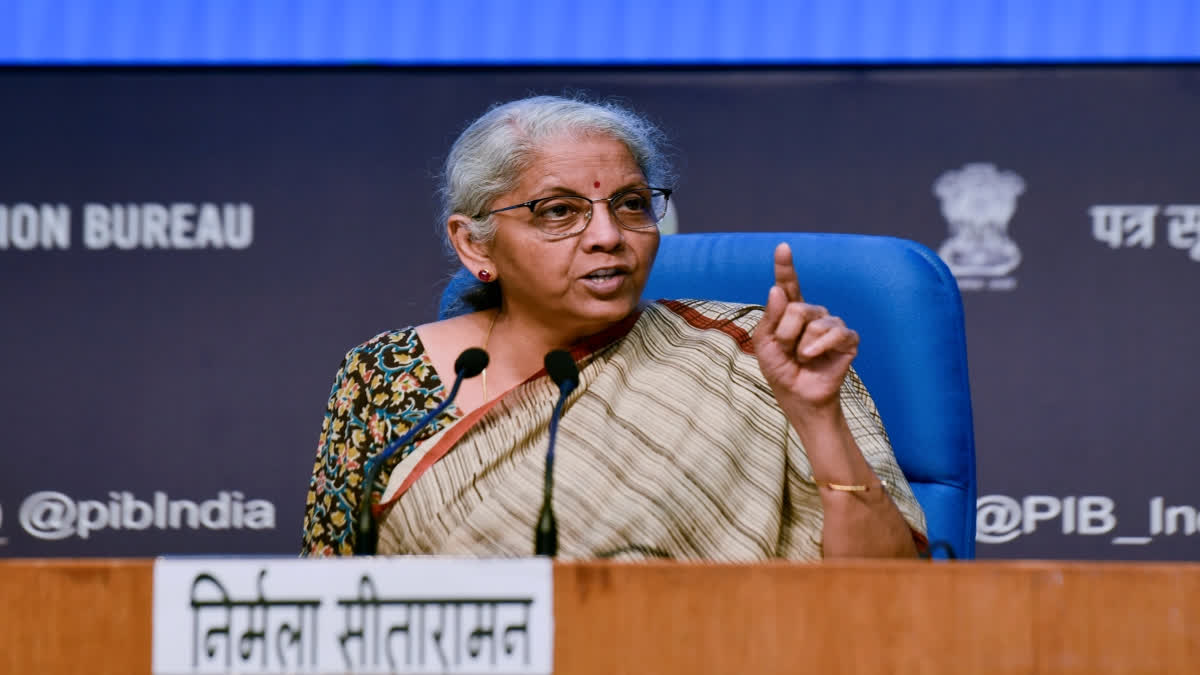New Delhi:When Finance Minister Nirmala Sitharaman rises to present the Union Budget later this month, it will be the 7th Union Budget to be presented by her and the first budget in the third term of Prime Minister Narendra Modi.
Just ahead of Lok Sabha elections, she presented the Interim Budget, or a vote of account, where the government takes Parliament’s approval for incurring government expenditure for the next two to three months so that a regular budget can be presented after the formation of a new Lok Sabha.
However, since it is the governance in continuity, so no major change is expected in the government policy and its focus is expected to remain on the four pillars – poor people, farmers, women and youth as was the case with the Interim budget.
In her budget speech, the finance minister had said that the needs of these four groups, their aspirations, and their welfare are the highest priority for the government.
"The country progresses when they progress. All four require and receive government support in their quest to better their lives. Their empowerment and well-being will drive the country forward," she had said.
Reaching Out To Poor
In the wake of the devastating impact of the Covid-19 global pandemic, which killed over 5.33 lakh people in India, the government started the world’s largest free food distribution programme for over 55 per cent of the country’s population. The PM Garib Kalyan Ann Yojana which was started in March 2020 has been extended till the end of 2028.
It led to a major expenditure of the Union government as the allocation for the Ministry of Consumer Affairs, Food and Public Distribution, the nodal ministry for the scheme, has gone up considerably since the launch of the scheme.
For example, the food subsidy bill for the FY 2019-20, before the outbreak of Covid-19, was just Rs 1.09 lakh crore. However, the next year in FY 2020-21, as against the budget estimate of Rs 1.16 lakh crore, the food subsidy bill rose to Rs 5.41 lakh crore. This sharp rise was also attributed to, among other things, the inclusion of off-budget food subsidies of the previous years into the Union budget.
But after the first Covid year, the food subsidy bill remained elevated and for FY 2021-22, it was Rs 2.89 lakh crore, for FY 2022-23, it was Rs 2.73 lakh crore, and for FY 2023-24, the revised estimates are Rs 2.12 lakh crore but the actual numbers may be higher when the latest data is presented on July 23.
Farmers
Though the government withdrew the three controversial farm laws in November 2021 but due to a variety of reasons, it is facing the angst and resentment of the farmers' community that led to the ruling party’s electoral loss in the agrarian states of Punjab and Haryana and Hindi heartland of Uttar Pradesh in 2024 Lok Sabha elections.
In order to win back the support of the farming community, Prime Minister Narendra Modi began the third term by announcing a major expansion of PM Avas Yojana in rural areas in this term and also released the instalment of PM Kisan Samman Nidhi from his constituency Varanasi immediately after taking the charge for the third time. In this budget, FM may further expand the welfare and irrigation schemes targeted at the farming community.
Women
Women are among the four focus areas of Prime Minister Narendra Modi’s government and the allocation for women and child development ministry has steadily gone up in recent years.
In this budget, the particular focus would be on Lakhpati Didi as Finance Minister Sitharaman may announce ways to strengthen the Lakhpati Didi scheme which was announced in the previous budget. The scheme targets nearly 10 crore women associated with over 90 lakh self-help groups (SHGs).
Youth
The Finance Minister announced the creation of a corpus of Rs one lakh crore in the interim budget. She said this corpus will be established with a fifty-year interest-free loan and it will provide long-term financing or refinancing with long tenors with low or nil interest rates.
According to the government, this will encourage the private sector to scale up research and innovation in sunrise sectors of the economy. Sitharaman said we need to have programmes that combine the powers of our youth and technology.
"For our tech-savvy youth, this will be a golden era," the FM had said. The government is expected to announce additional measures in the upcoming budget to further strengthen the startup and entrepreneurship culture in the country. Moreover, the government has announced an increase in the budget for school education and higher education.
While the budget allocation for school education has been increased from nearly Rs 97,000 crores in FY 2022-23 to nearly Rs 1.28 lakh crores for the current financial year, the budget for higher education has been increased from over Rs 53,000 crores in FY 2022-23 to Rs over Rs 63,000 crores for the current financial year.
It is expected that Finance Minister Sitharaman may announce fresh measures to further strengthen higher education and research in the country in the upcoming budget.
